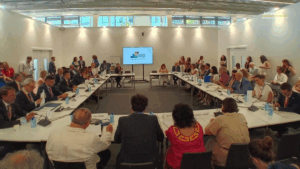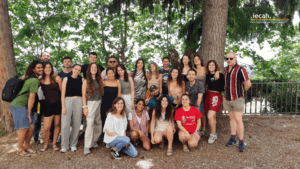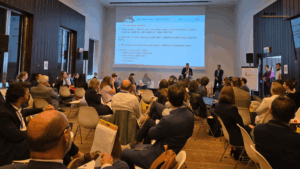Ivory Coast: the phantom of civil war

Western Africa is a region characterized by political, socio-economic and environmental crisis. Civil wars, military coups, failing or failed states, ethnic and religious intolerance, very weak economies, poverty and low life standards are the keywords to describe the region. In the nineties there were the cruel civil wars in Sierra Leone and Liberia and the ethnic conflicts and unrest in Nigeria. More recently there were the military coups in Mauritania, Guinea and Niger and the renewed armed conflict between rebels in the Niger delta and the government and the clashes between Muslims and Christians in Nigeria. A country that neither escaped the turbulent nineties and entered the new century with military coups and civil war is Ivory Coast. Although the civil war came to an end with the signing of the Ouagadougou Political Agreement in 2007, the situation remains volatile and different international observers fear for an outburst of broad-scale violence.
Unlike many African countries Ivory Coast became a model of political stability and economic prosperity after its independence. Although far from democratic the one-party regime of Felix Houphouet-Boigny was highly effective. The country knew a rapid economic growth –at the beginning of the 80s it had one of the highest per capita incomes of sub-Sahara Africa- thanks to its close ties with France, resulting in preferential deals for Ivorian cash crops (coffee, cocoa, timber, palm oil, pineapples), high world prices for commodities, foreign investments and the importance of Abidjan as the region’s main port. Many immigrants from the poorer neighboring countries (Burkina Faso, Mali, Mauritania, and Guinea) came to Ivory Coast to work on the plantations.
Everything went well as long the paternalist system, headed by a charismatic political leader, could use good economic conditions to co-opt opposition and to quiet ethnic discontent by distributing governmental posts and political appointments. When Africa’s longest president in office died in 1993, problems soon emerged. The liberalization of the global markets brought a dramatic drop in primary product prices, providing the paternalist system with fewer resources, the adopted Structural Adjustment Program rolled back state subsidies, the booming economy had led to more inequality between the elite and the peasants and the sudden and forced step towards democratization reified ethnic differences. As a result the state disintegrated rapidly and the new political elite had to invent a new discourse to mobilize the masses.
Looking to appeal to nationalist elements in an attempt to preserve the privileged position of the Akan, the new regime of Henri Konan Bédié decided to launch a policy of ivoirité (Ivorianness) during the 1995 general elections. An individual could only be a citizen of Ivory Coast if his parents belonged to one of the ethnic groups native to Ivory Coast. The Bédié regime described immigration as one of the structural causes for the increase in poverty of Ivoirians, given that they occupied a hegemonic position in the countries’ economy, preventing Ivorians to compete with them. Also on religious issues immigrants or persons with immigrant backgrounds, almost all Muslims, were excluded through the regime’s valorization of Christianity as a essential component of being Ivorian. The outcome of the policy of ivoirité was that Ivorian Muslims were amalgamated with foreign Muslims and people from the north of Ivory Coast were amalgamated with immigrants, questioned openly their belonging to the Ivorian nation given that many northern Ivorians are Muslim and have the same family names as the citizens of the neighboring countries. Subsequently a number of Muslim northerners lost their government positions, sowing the seeds of a north-south, Muslim-Christian divide, and many immigrants were forced to leave the country.
In December 1999 the country knew its first coup d’état, bringing to power the Yacouba ethnic group of coup leader general Robert Guéï. The policy of Ivorianness was given a new impetus, further excluding the northern population. The end up was communities frightened by each other on the basis of identities which used to be permeable but which were gradually fixed. A materialization of the policy of ivoirité was the exclusion of Alassane Dramane Ouattara, leader of the Ivory Coast’s main opposition party RDR (Rassemblement des Républicains), from participation in the presidential and parliamentary elections of 2000 because of his foreign parentage. The RDR’s decision to boycott the elections opened the way for the nationalist Laurent Gbagbo to win the presidential seat. With only 37% of the electorate voted, Ouattara’s supporters went on the street to call for new elections. Violent clashes with Gbagbo’s security forces were the result. The targeting of immigrants and northerners reached unprecedented levels. Holders of resident’s cards and Ivorians with northern names were often the victims of systematic police harassment and humiliation.
In September 2002, 800 disgruntled soldiers under the command of the same young non-commissioned officers who led the 1999 coup tried to topple Gbagbo (the sixth coup d’état in less than three years). Although the coup failed, the rebels were able to seize cities and towns in northern regions, where they gained substantial local support by voicing ongoing discontent of the northern population. Rapid intervention by French troops blocked the rebels from moving south to Abidjan. Guillaume Soro, a former student leader, became the leader of the rebels, calling themselves the Mouvement Patriotique de la Côte d’Ivoire (better known by its later name the Forces Nouvelles (FN)). A civil war broke out, dividing the country in two and provoking the death of thousands, the displacement of hundred thousands, the rape of innumerable women and the assaulting of foreigners or supposed foreigners by crowds (mainly Gbagbo’s nationalist youth movements) and Ivorian security forces. Both sides militarized the population and recruited several thousand young combatants. As in every armed conflict troop indiscipline on both sides grew, coupled with the fractionalization and criminalization of local rebel commanders. A dangerous dynamic was the increasingly link with a regional conflict (the wars in Sierra Leone and Liberia) due to the involvement of Burkina Faso and Liberia.
After numerous peace attempts the Forces Nouvelles and Gbagbo came to an arrangement in March 2007, signing the Ouagadougou Political Agreement (OPA). The OPA foresaw the establishment of a transitional government with Soro as Prime Minister, disarmament of all armed factions, reunification of the country, identification of Ivorians and presidential elections in 2008. Three years after its signing, there is still much to be implemented. The demobilization and disarmament of the rebels and militias made no or little progress, the organization of elections is continuously postponed, the publishing of an electoral list polarized the country’s political elite and in some regions the situation remains very insecure due to the presence of militias and armed gangs. Of major concern is the great antagonism between Ivory Coast’s main political parties and leaders and the reemergence of the concept of iviorité in the political debate and media. Together with the very hard socio-economic circumstances –the global crisis caused a significant drop in the prices for natural resources and remittances from overseas workers-, it makes the situation very volatile. The country is still plagued by a lot of communal and sexual gender-based violence. Security forces act aggressively and use excessive forms of violence against civilians, and in the extreme west pro-governmental militias maintain a climate of fear and insecurity. February’s events, when there was an outburst of violence after Gbagbo’s decision to dismay the electoral commission and government, show how tensioned the situation is.
The behavior of the presidential camp reveals Gbagbo’s unwillingness to accept a electoral defeat, manipulating the electoral process to assure his seat at all costs, even if that includes to drag the country at the brink of a new civil war. His refusal to put one million civilians, almost all northerners, on the electoral list, doubting openly their Ivorian nationality, and accusing the RDR of being responsible for the war throws oil on the fire in a country marked by ethnic violence and no reconciliation what so far. The danger consists in that more and more Ivorians perceive violence as the only exit for the status quo and electoral blockage. Especially among the youngsters there is a growing frustration and radicalization that can be easily manipulated by political elites for their own purposes
.
More international pressure on Ivory Coast’s political leaders will be necessary to unblock the current situation. This involves the possibility of sanctions against those individuals who are responsible for violence and the blocking of the electoral process. A new armed conflict will destabilize further the Gulf of Guinea, undermining the peace and reconciliation process in Liberia and Sierra Leone and aggravating the situation in Guinea.




